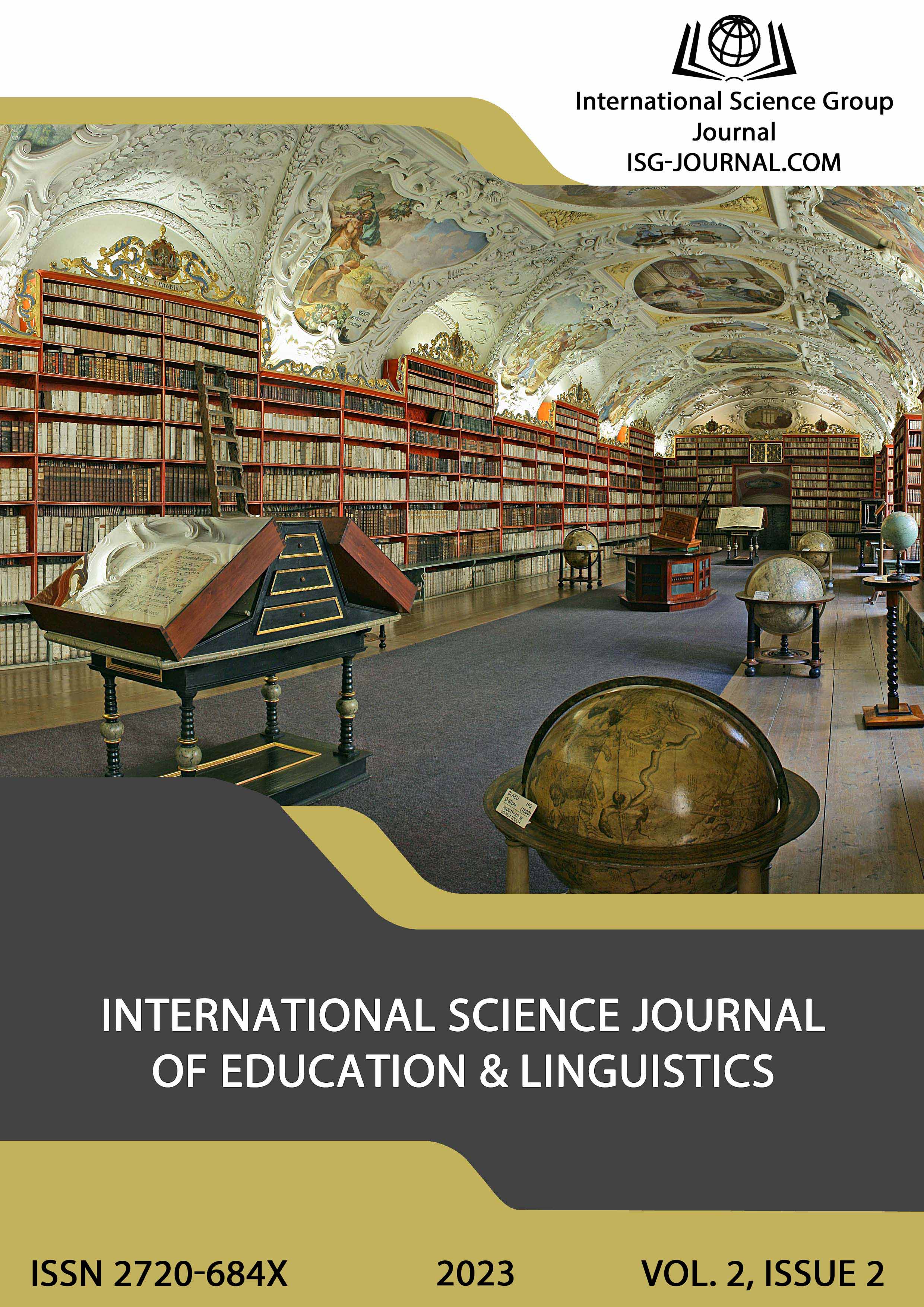Dynamics of empathic abilities of interns in the specialty "anesthesiology"
DOI:
https://doi.org/10.46299/j.isjel.20230202.04Keywords:
interns, postgraduate education, pandemic, wartime, empathyAbstract
The dynamics of empathic abilities of interns specializing in "anesthesiology" were studied depending on the periods of local military conflict, the COVID-19 pandemic, and full-scale war in Ukraine. For conducting such studies, the M. Davis Interpersonal Reactivity Questionnaire (IRI) is the most valid and accessible. 240 anonymous questionnaires of interns in the specialty "anesthesiology" were analyzed. They showed higher empathic abilities than young colleagues of other specialties. The most significant increase in indicators was observed on the "empathic distress" scale, which is a psychological and protective reaction. The greatest decrease in empathic characteristics was documented on the "fantasy empathy" scale, which is explained by a more realistic perception of reality during social disasters. In the conditions of the pandemic and martial law, anesthesiologist interns showed a progressive increase in cognitive-productive empathic abilities against a decrease in emotional reactivity (affectiveness).
References
Філліпс К.У. (2020) Майбутнє почуттів. Розвиток емпатії в світі, одержимому технологіями. Київ : «Рідна мова», 164.
Sulzer, S. H., Feinstein, N. W., & Wendland, C. L. (2016). Assessing empathy development in medical education: A systematic review. Medical Education, 50(3), 300–310. https://doi.org/10.1111/medu.12806
Yechalov, V. V., Kravets, O. V., & Sedinkin, V. A. (2021). Empathic abilities of internship doctors of various profiles. International Journal of Education and Science, 4(2), 72–76. https://doi.org/10.26697/ijes.2021.2.8
Павлюк Т.В., Толокова Т.І. (2018) Емпатія у професіональній діяльності медичних сестер. Медсестринство, 1, 53- 56.
Guilera T, Batalla I, Forné C, Soler-González J. (2019) Empathy and big five personality model in medical students and its relationship to gender and specialty preference: A cross-sectional study. BMC Med Educ., 19(1), 1–8. https://doi.org/10.1186/s12909-019-1485-2
Gleichgerrcht E., Decety J. (2003) Empathy in clinical practice : how individual dispositions, gender and experience moderate empathic concern, burnout and emotional distress in physicians. PLoS ONE, 8 (4), 767–780.
Гусакова І.В. (2013) Емпатія у сфері медичної освіти - діагностичні інструменти. Медична освіта, 1, 51-54.
Weilenmann S., Schnyder U. & Parkinson B. (2018) Emotion Transfer, Emotion Regulation, and Empathy-Related Processes in Physician-Patient Interactions and Their Association With Physician Well-Being: A Theoretical Model. Hypothesis and Theory. Fronties in Psychiatry, 9, 389. https://doi.org/10.3389/fpsyt.2018.00389
Колісник А.М., Данілова В.В., Стародуб А.С. (2019) Рівень емпатії у лікарів-дитячих анестезіологів. Advances of science: Proceedings of articles the international scientific conference. Czech Republic, Karlovy Vary – Ukraine, Kyiv (22 February 2019). Kyiv: MCNIP, 55-59.
Єхалов В.В., Багуніна О.О. (2021) Емпатійні здібності та конфліктна компетентність лікарів-інтернів за фахом «Дитяча анестезіологія». Особливості модернізації предмету досліджень представників медичних наук: збір. тез наук. робіт учасників міжнародної науково-практичної конференції (м. Київ, 4-5 червня 2021 р.). Київ : «київський медичний науковий центр», 15-19.
Ekhalov V.V., Kravets O.V., Stus V.P., Moiseenko M.M., Barannik S.I. (2021) Sociopsychological image of the modern intern (educational and social research). Urology, 25, 1, 71-80. doi: 10.26641/2307-5279.25.1.2021.231404
Мазяр О.В., Бученко Л.І. (2009) Особливості конфліктної поведінки підлітків в залежності від рівня навчальної успішності. Житомир, 33-35.
Куліш О. В., Сіпко Л. О. (2022) Вплив емпатії на формування синдрому емоційного вигорання у медичних працівників. Науковий вісник Ужгородського національного університету. Серія: Психологія, 1, 33-36. doi: https://doi.org/10.32782/psy-visnyk/2022.1.6
Elhadi M., Msherghi A., Elgzairi M. (2020) Psychological status of healthcare workers during the civil war and COVID-19 pandemic: A cross-sectional study. Journal of Psychosomatic Research, 137, 110221, 1-6.
Owen R.P., Wanzer L. (2014) Compassion fatigue in military healthcare teams. Arch Psychiatr Nurs, 28(1), 2-9. doi: 10.1016/j.apnu.2013.09.007.
Yekhalov V.V. Kravets O.V., Stus V.P., Moiseienko M.M., Stanin D.M., Krishtafor D.A. (2021) Emotional burnout syndrome in primary specialization doctors. Urology, 25, 2, 148-152. doi: 10.26641/2307-5279.25.2.2021.238243
Davis M. A (1980) Multidimensional Approach to Individual Differences in Empathy. Journal of Personality and Social Psychology, 10, 5-16.
Davis MH. (1983) Measuring individual differences in empathy: evidence for a multidimensional approach. Journal of Personality and Social Psychology, 44(1), 113–126.
Lorca M.M., Zabala-Baños C., Calvo S.M., Romo R.A., Martínez-Lorca A. (2023) Assessing emotional, empathic and coping skills in Spanish undergraduates in Health Sciences and Social Sciences. Retos, 47, 126-137
Миралеева А.И., Аманжол Д.М., Ерғазы Г.Е., Жолдыбаева И.М., Өмірзақ А.А. (2021) «Марат Оспанов атындағы ЗҚМУ» ҰҒАО студенттері арасында Эмпатияны коммуникативтік құзыреттіліктің маңызды құрамдас бөлігі ретінде IRI сауалнамасын қолдану арқылы зерттеу: қималық зерттеу. West Kazakhstan Medical Journal, 63 (3), 129-137. doi: 10.24412/2707-6180-2021-63-129-137
Aoki Y., Katayama H. (2021) Development of the Clinical Interpersonal Reactivity Index to evaluate nurses’ empathy. Nursing & Health Sciences, 23(4), 862–870. doi: 10.1111/nhs.12875
Girotto L.C., Carreira R.dF., Esteves A., Tempski P.Z. (2022) Assessment tools for evaluating empathy in health professions students: A systematic review legirotto. Posted Date: July 8th, 2022. doi: https://doi.org/10.21203/rs.3.rs-1623797/v1
Єхалов В.В., Кравець О.В., Кріштафор Д.А. (2021) Конфліктна компетентність суб’єктів медичної освіти в динаміці. Матеріали третього міжнародного симпозіуму «Освіта і здоров’я підростаючого покоління»: Зб.наук. праць в 2-х частинах / За ред. Страшка С.В. К. : Алатон, 3. 1, 217-218.
Кундій Ж., Андрейко С. (2021) Формування емпатійних здібностей майбутніх медичних працівників [Електронний ресурс]. Імідж сучасного педагога, 6 (201), 72–76. https://doi.org/10.33272/2522-9729-2021-6(201)-72-76
Головенко Х.В., Сопель О. (2017) Поширеність синдрому емоційного вигорання у медичного персоналу і фактори, які спричиняють його розвиток. Медсестринство, 4, 51-53.
https://doi.org/10.11603/2411-1597.2017.4.8550
Мітіна С.В. (2017) Емпатія як професійно важлива якість медичного фахівця. Науковий вісник Херсонського державного університету, 1, 1, 83-88.
Downloads
Published
How to Cite
Issue
Section
License
Copyright (c) 2023 Василь Єхалов, Ольга Кравець, Ольга Пилипенко, Дар'я Кріштафор

This work is licensed under a Creative Commons Attribution 4.0 International License.





